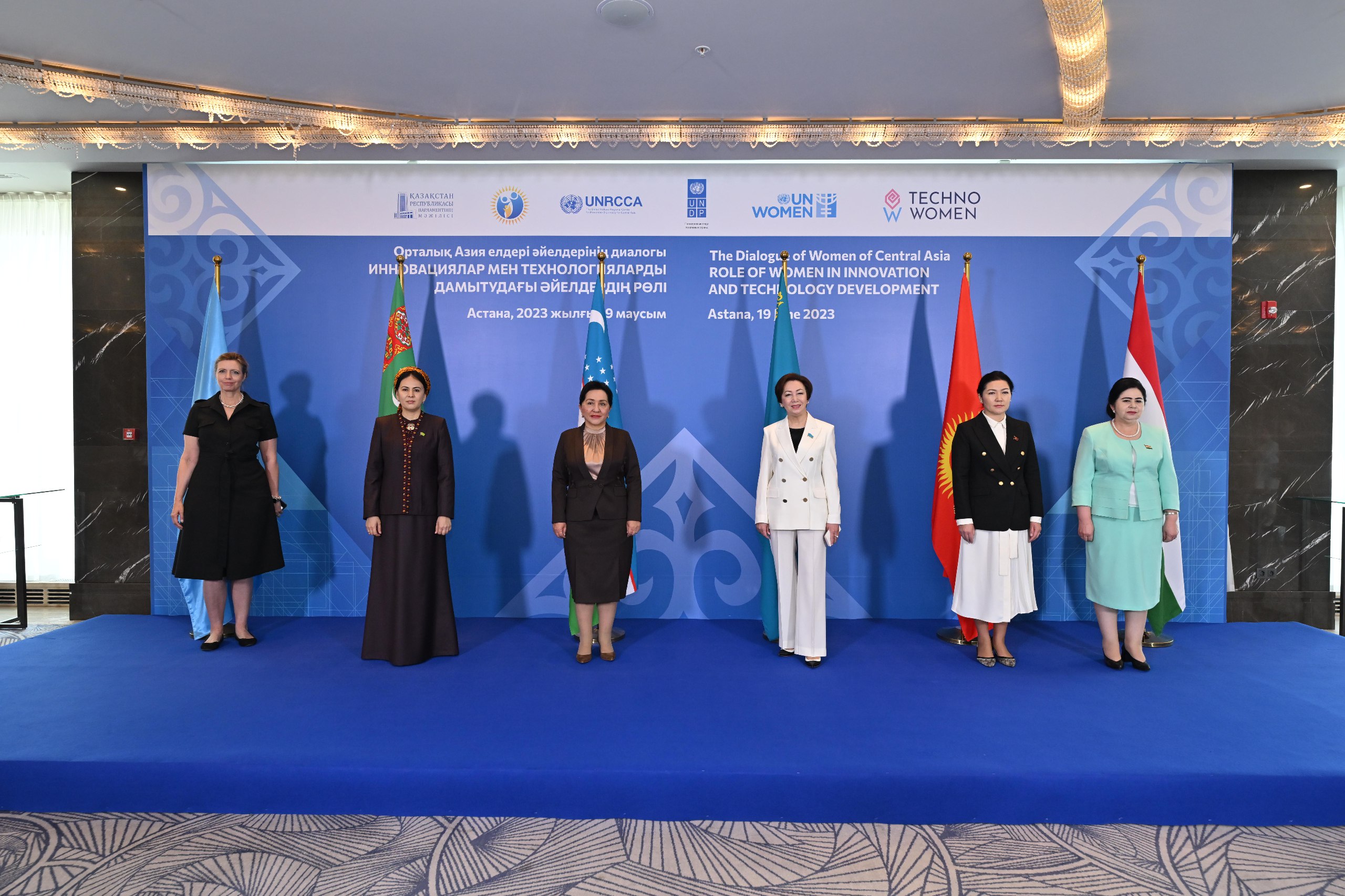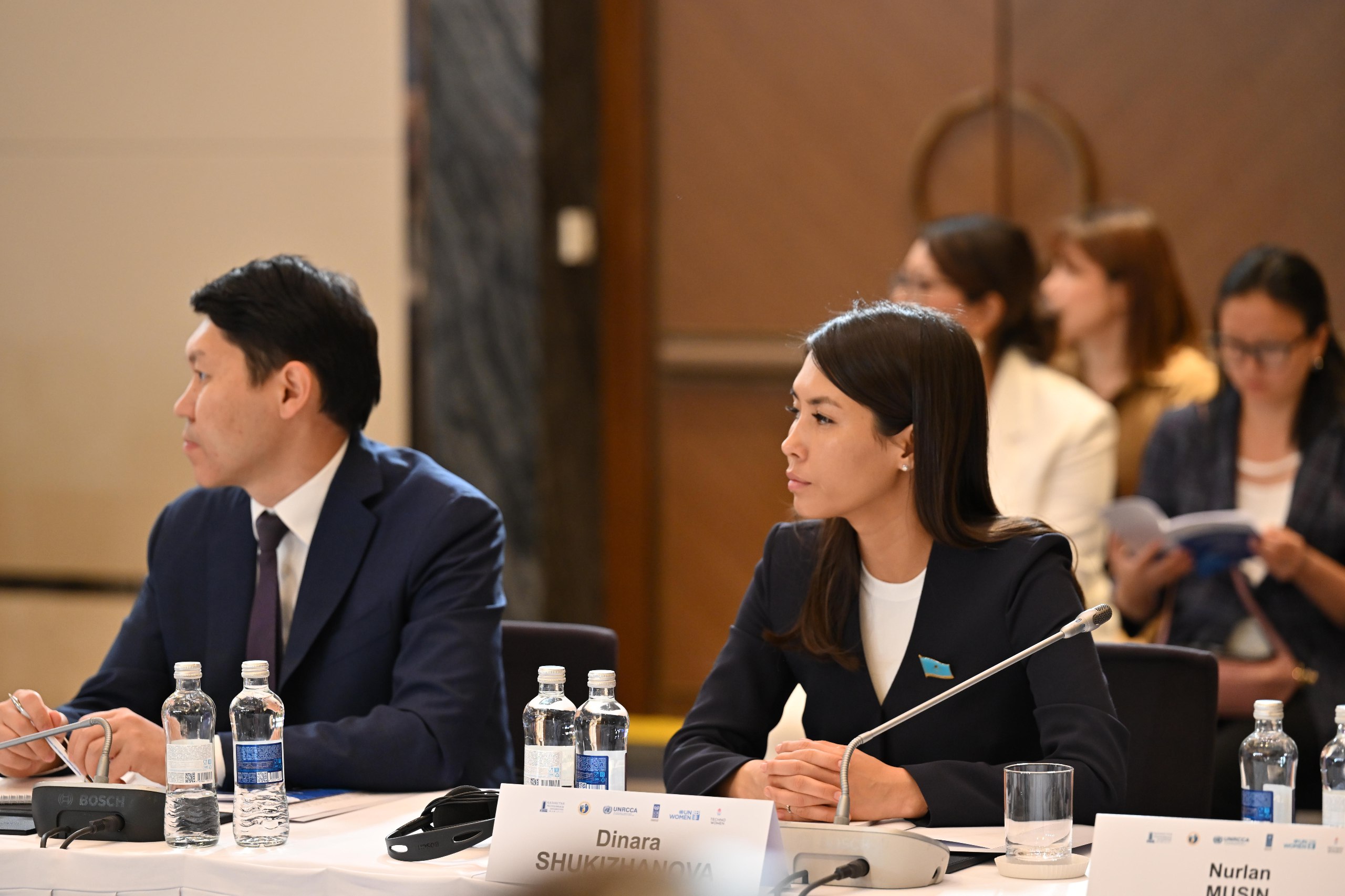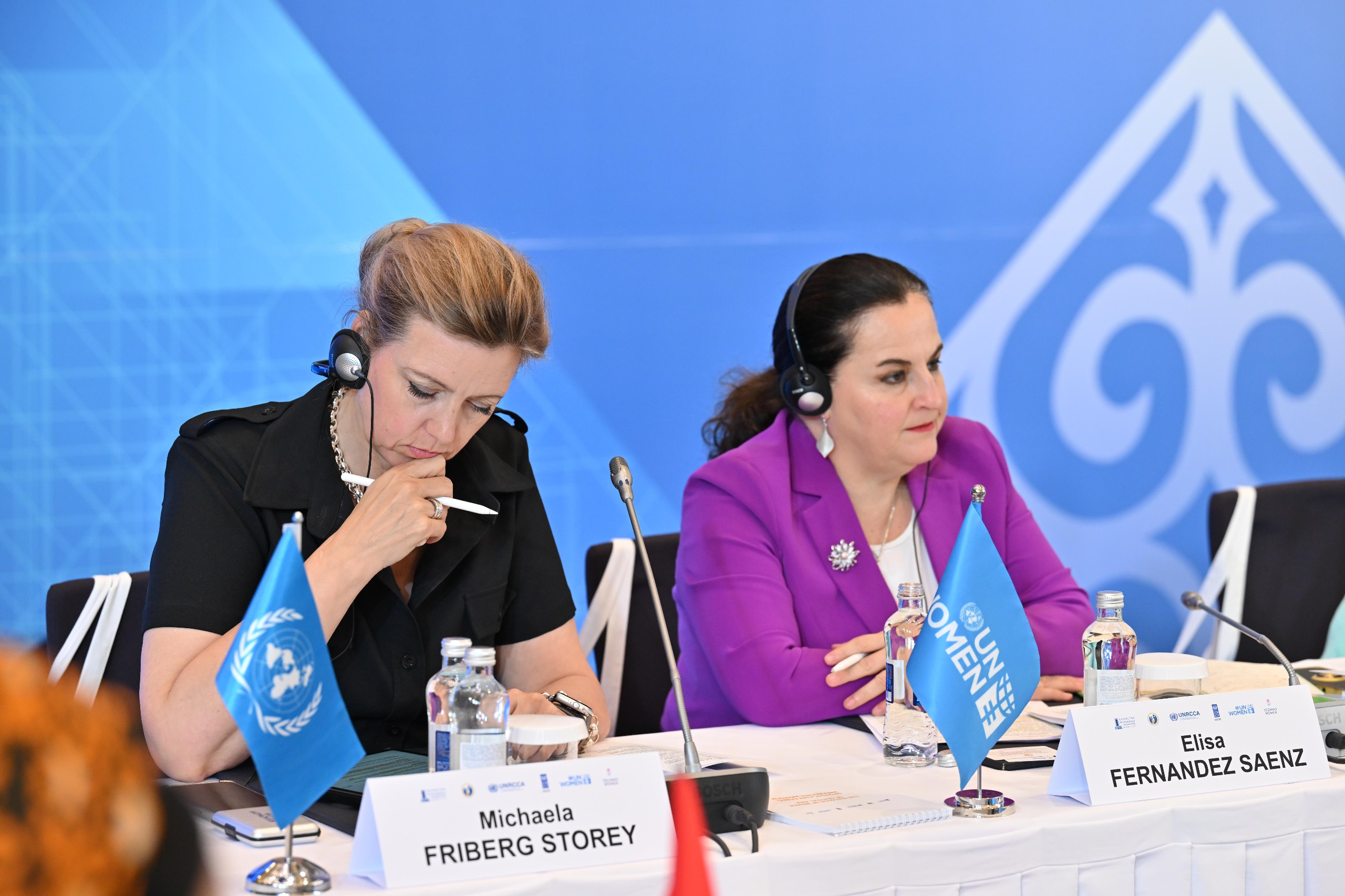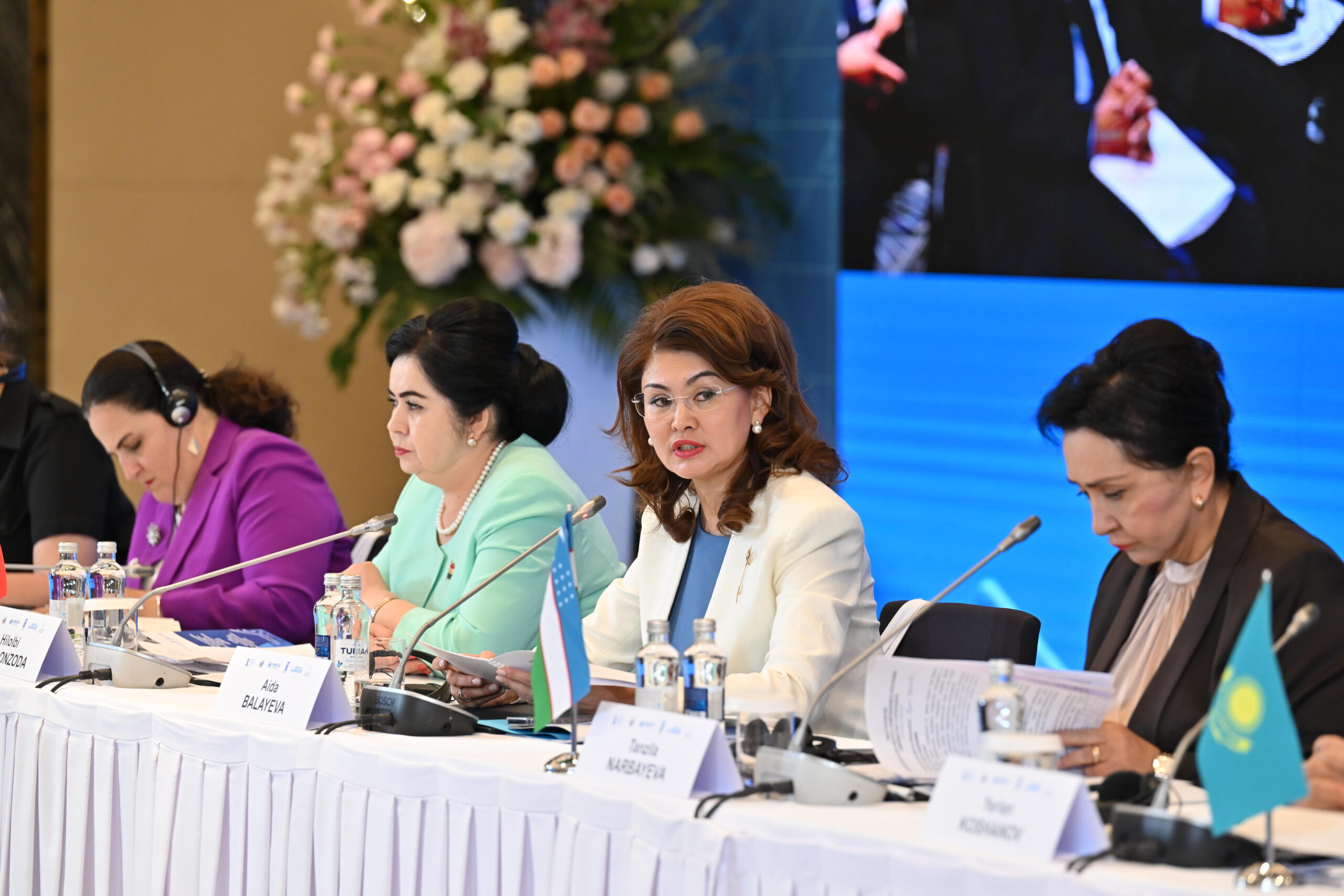ASTANA – Kazakhstan commenced its role as chair of the Dialogue of Women of Central Asia on June 19, an informal platform that brings together female parliamentarians from the region to discuss ongoing developmental issues and strengthen cooperation.

From L to R: Michaela Friberg-Storey, Chairwoman of Science, Education, Culture and Youth Policy Committee at Turkmenistan’s Mejlis Bahar Seyidova, Tanzila Narbayeva, Deputy Speaker of Kazakhstan’s Mazhilis Daniya Yespayeva, Jamilya Isayeva and Chairwoman of Women’s Affairs and Family Committee of Tajikistan Hilolbi Qurbonzoda. Photo credit: parlam.kz.
Supported by the United Nations Regional Center for Preventive Diplomacy for Central Asia (UNRCCA), the UN Development Programme (UNDP), and the UN Women, the dialogue platform was launched in December 2020 and was chaired by Uzbekistan in 2021 and Turkmenistan in 2022.
The meeting in Astana gathered members of the National Commission for Women Affairs, Family and Demographic Policy, parliamentarians from Kazakhstan, the Kyrgyz Republic, Tajikistan, Turkmenistan and Uzbekistan, heads of state bodies, as well as representatives of civil society and international organizations.
This year’s forum delved into the role of women in innovation and technology, with all speakers agreeing that women should be at the forefront of change, driving a more robust and improved future.
Country’s development level is measured by women’s position
Opening the event, Yerlan Koshanov, Speaker of the Mazhilis, the lower house of the Kazakh Parliament, emphasized the important contribution by women to the nation’s civil society development. He highlighted that bridging the digital gender divide should be a priority in Central Asian countries.

Dinara Shukizhanova is a Deputy Chairwoman of Kazakhstan’s Respublica party, represented in the Mazhilis. Photo credit: parlam.kz.
“Women in Central Asia are actively involved in the development of information and communication technologies, leaving no stone unturned in the stereotypical perception that it is not a woman’s job,” said Koshanov.
He noted that although the platform is relatively new, it plays a crucial role in the region’s integrational processes.
“President Kassym-Jomart Tokayev pays special attention to gender equality and protection of women’s rights. He is convinced that the level of development of a country is measured by the position of women in society,” said Koshanov, emphasizing Kazakhstan’s efforts to promote women’s voices at higher decision-making levels and calling for legislative changes to foster women’s empowerment.
Women’s crucial role in tech and innovation
Tanzila Narbayeva, Chairwoman of the Senate of Uzbekistan, also noted that with the establishment of the Women’s Dialogue platform in 2020, consistent and large-scale work to ensure women’s rights and interests has been carried out in the region.
“During the chairpersonship of Uzbekistan and Turkmenistan, important documents were adopted, major events were held, which had a significant impact on the implementation of effective measures at the regional level. We consider this a manifestation of the great interest by the countries of the region in further dialogue, increasing its effectiveness and recognition in the international arena,” Narbayeva said.
She brought up UN data, which indicates that three billion people, mostly girls and women, do not have access to the internet.
“We fully agree with the UN Secretary-General António Guterres that without women’s participation, the field of science and technology reaches only half its potential,” she said, emphasizing the importance of expanding women’s access to higher education.
In Uzbekistan, she noted, the number of women in higher education soared from 110,000 in 2017 to 500,000 in 2023. Nearly 1.5 million women in the country of 35 million are involved in knowledge-intensive areas.
She echoed Koshanov’s remarks on increased cooperation in the region and the presence of political will to continue these efforts.
“For such a short period in the relationship between our countries, we have achieved a significant increase in regional cooperation in all spheres, including gender equality issues and support for women,” said Narbayeva.
Deputy Chief of Staff of the President of Kazakhstan Aida Balayeva focused on the integration of efforts of women in Central Asia, the business community, academic and scientific circles, and non-governmental and civil society sectors.
Balayeva, who also chairs the National Commission for Women Affairs, Family and Demographic Policy, said gender equality and greater involvement of women guarantee correct political decisions. She also proposed to expand cooperation between scientific and expert communities of Central Asian countries on demographic development and gender issues.
“Moreover, I propose that we work together to combat such social ills in our societies as domestic violence, forced marriages, early pregnancies and human trafficking,” said Balayeva.
Jamilya Isayeva, Vice Speaker of the Jogorku Kenesh (Supreme Council, the unicameral Parliament) of the Kyrgyz Republic, noted the important role of women in the development of innovation and technology.
“The employment of women in science, technology and engineering is still relevant. I believe that in any sector, women’s rights and contributions are vital for the future, including in the development of technology and innovation,” said Isayeva, adding that in the Kyrgyz Republic a large number of digital projects are being developed and led by women.
Women and girls still at risk from the ongoing crises
UN Resident Coordinator for Kazakhstan Michaela Friberg-Storey spoke about the lasting impact of COVID-19, the climate crisis and the geopolitical situation that might push millions back into unemployment, poverty and exclusion.

Michaela Friberg-Storey and Elisa Fernández. Photo credit: parlam.kz.
“Millions of men, women, boys and girls are held back. Millions of women and girls run the risk of being left behind. We have seven years left to reach the 2030 agenda. The Sustainable Development Goals are a blueprint for people, planet prosperity and peace,” said Friberg-Storey.
There are two unique opportunities arising from this crisis, she noted. The first is to empower women and girls to be the drivers of change, and the second relates to digitalization to leap forward in development.
“We need to identify opportunities, or we will make sure that women and girls will pay a higher price than anybody else when it comes to development,” she said.
Patriarchal norms hinder progress toward gender equality
Besides these risks, patriarchal norms deeply embedded in societies in the region inhibit the progress on women’s empowerment, said Elisa Fernández, Deputy Regional Director at UN Women Europe & Central Asia.
“Central Asia is a region with immense diversity, cultural richness and historical significance. Yet, it is also a region that faces unique gender disparities. Traditional patriarchal norms, which are deeply rooted, continue to impede the progress of women and girls in various aspects of life, such as education, employment and political participation. However, today, we’re here to reaffirm our commitment to work together and change this narrative,” said Fernández.
Women and girls should have equal access to opportunities, resources, and decision-making, she stressed.
“We are here to amplify the voices of Central Asian women and ensure their concerns are heard, acknowledged and acted upon. Let us recognize the transformative power of digitalization and innovation in shaping the lives of women and girls in Central Asia.”
Technology can help countries “bridge the gender gap, expand access to education and health care, provide economic opportunities, amplify women’s voices and strengthen their participation in decision-making.”
“Through innovative solutions, we can create a future where Central Asia women and girls are empowered, connected and equipped to overcome the barriers,” she added.
Women’s voices in decision-making
President and Founder of the Women Political Leaders network, Silvana Koch-Mehrin, raised three examples of how technology and innovation can shape women’s future for the better.

From L to R: Elisa Fernández, Hilolbi Qurbonzoda, Aida Balayeva and Tanzila Narbayeva. Photo credit: parlam.kz.
“First is the car industry. We see cars developing and innovating. They are becoming more efficient and safer. Digital services are provided. We know how to charge our phones, where to put our coffee cups. But do we know where to put our handbags? There’s something missing. It is [the involvement of] women in the process. (…) It does make a difference who puts their thoughts, their thinking, and their vision on development and innovation,” she said.
Another example is femtech, technology development with a focus on women.
“That’s particularly relevant in places and geographies where there is no immediate health infrastructure. For example, how long does it take you to go with your child to the doctor? How long does it take you for your health needs to find the relevant expertise? With femtech, there are devices, technology, and applications developed that deal with specific women’s issues like thyroid and iron deficiency, which can develop into big health concerns if not taken care of,” she said.
Women can also benefit from the rapid development of artificial intelligence.
“It offers a tremendous opportunity to reverse outdated wrong stereotypes and prejudices against women if the frameworks are right. That’s really relevant for women leaders in politics to be part of those that make the rules around AI,” said Koch-Mehrin, who is also a former Vice-President of the European Parliament (2009-2011) and a member of the European Parliament (2004-2014).
Around the world, laws still exist that treat women and men differently. Citing the World Bank study, she said there are less than 20 countries in the world that treat women and men by law the same way. “That’s very sobering to see,” she said.
According to her, including women and ending discrimination against women is “not only the right thing to do but also the smart thing to do.”
“The President of the European Central Bank, Christine Lagarde, always points out that including women in the economy would be like adding another China and India to the world economy. So massive growth would happen,” she added.
She commended the Central Asian regional dialogue, saying regional cooperation matters, referring to her experience in the European Parliament.

